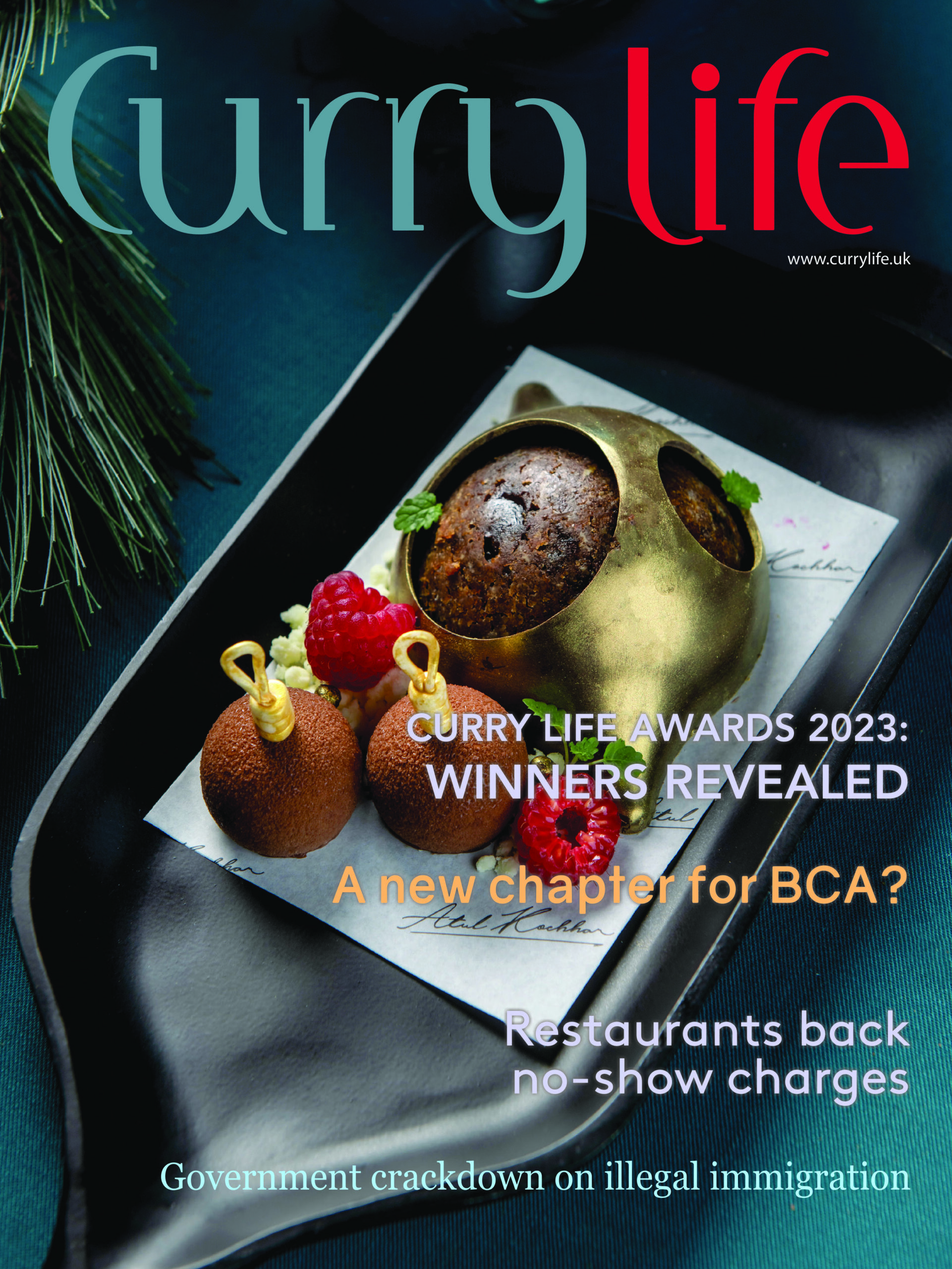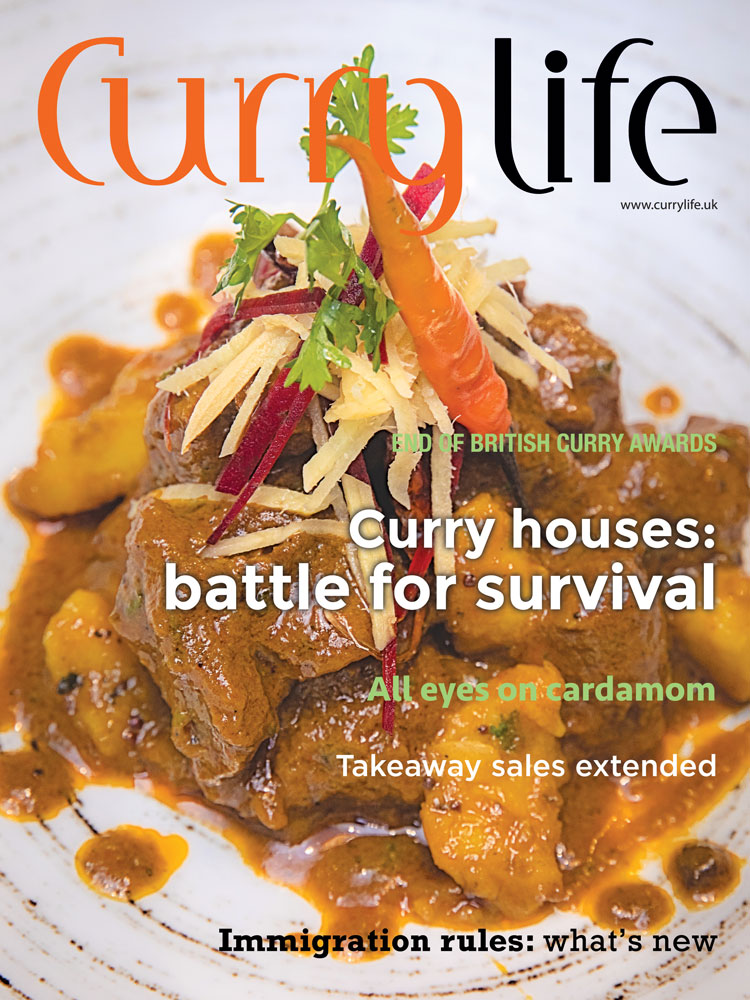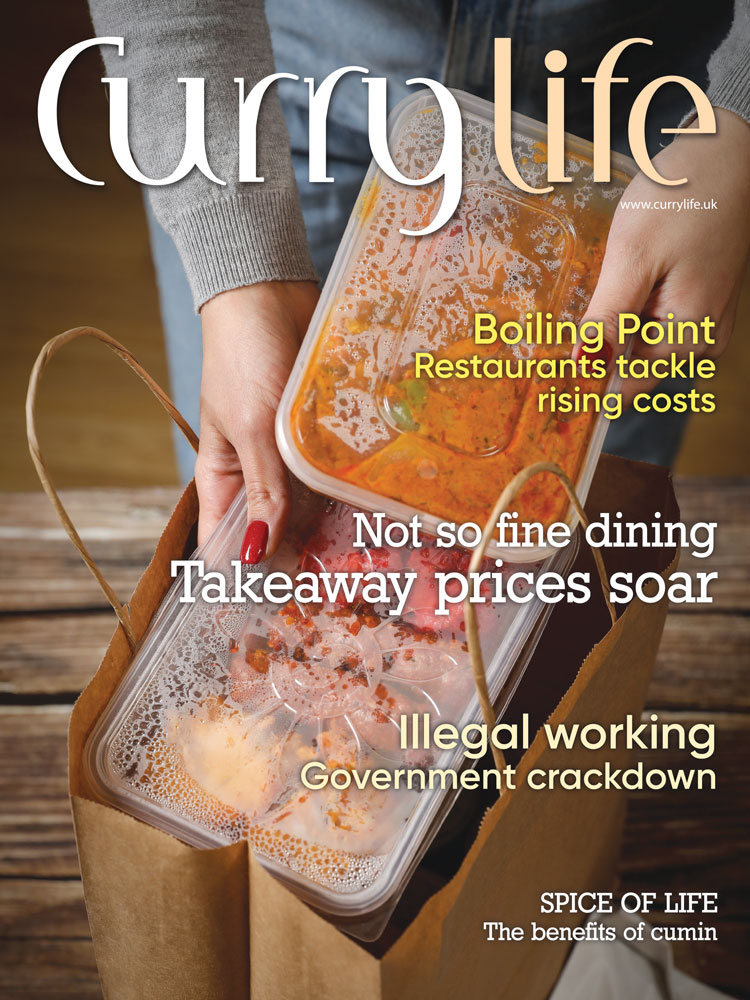
Curry Life 105
Curry Life is Britain’s No.1 curry magazine, and it is distributed FREE to thousands of Indian, Bangladeshi, Pakistani, Sri Lankan, and Nepalese restaurants.
Read more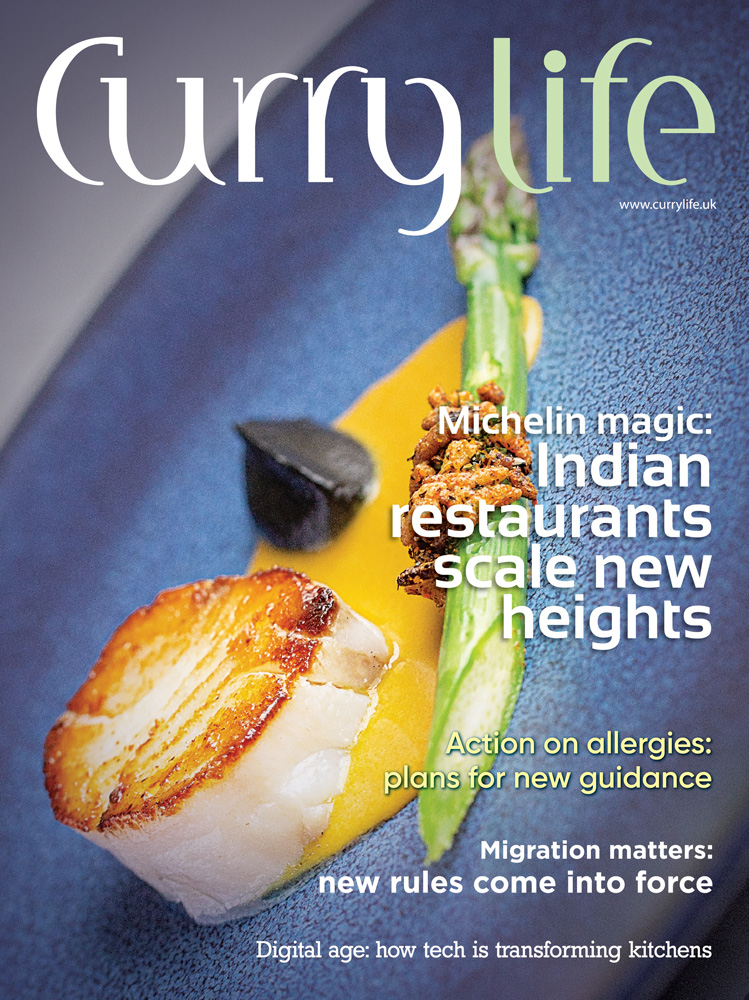
CURRY LIFE 104
Curry Life is Britain’s No.1 curry magazine, and it is distributed FREE to thousands of Indian, Bangladeshi, Pakistani, Sri Lankan, and Nepalese restaurants.
Read more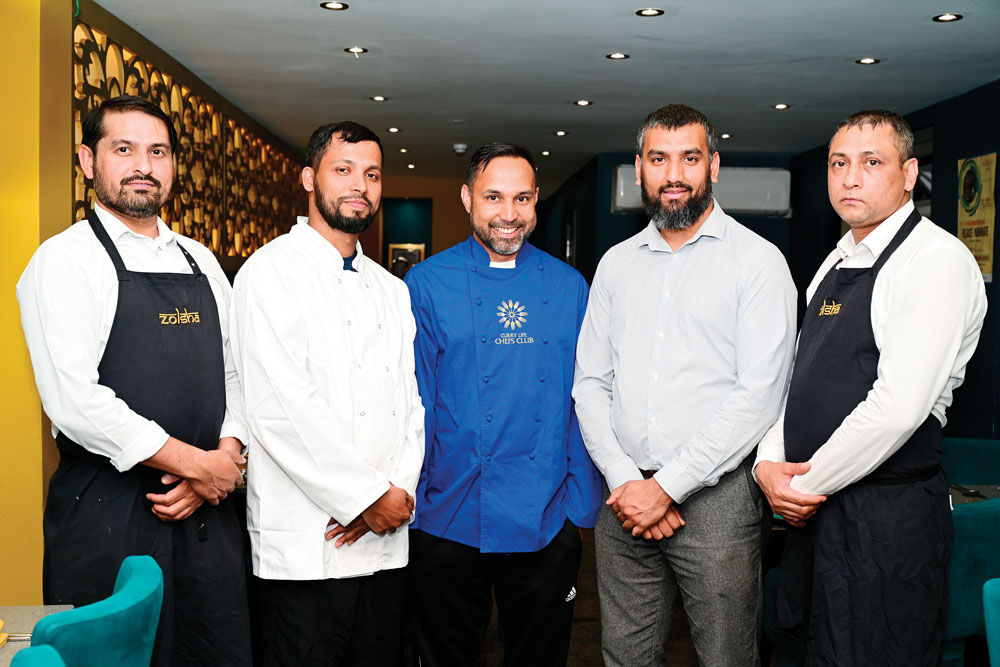
TURNING A PASSION INTO A BUSINESS
Zolsha has been going strong for 15 years and is looking to make the next 15 and more count

Azid Ahmed, or Ash as he prefers to be known, has taken an unusual path to opening his own curry house. No one in his family had former ties to the restaurant industry but over the last 14 years, he has established Zolsha as a destination restaurant, based on his passion for food and service and a willingness to keep on learning. The restaurant is based in Howden near Goole in Yorkshire and regularly attracts positive reviews from diners, who praise its ‘excellent reputation’, ‘varied menu’ and ‘friendly service’.
Ash knew from a relatively early age that working in the restaurant industry was what he wanted to do, despite having little experience.
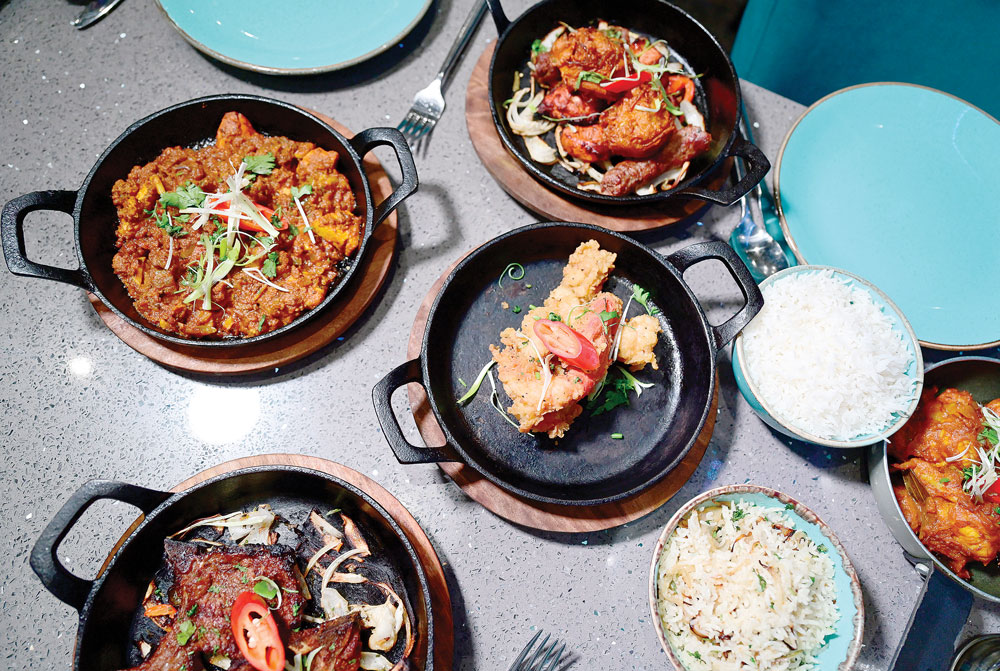
“When I left school I went into the trade full time – it’s all I’ve ever known. By the time I was 19, I felt I was quite ready to open a business but because I was young people were reluctant to invest in me and my business,” recalls Ahmed. “They never said no but they did say let’s wait and see. My father used to work in the mills but I’ve always been attracted to the catering industry – I like interacting with people and I thrive in busy environments.”
Determination and wanting to follow his passion spurred Ash on – in his words, ‘you know when you enjoy something and there is a reward for it.’ His friends and family rightly had trust and conviction in his ability to run a restaurant, helping him to fund the venture. He opened Zolsha (which means ‘gathering’), in 2009 at the age of 23, on the site of a former pub and spent close to a year on renovations.
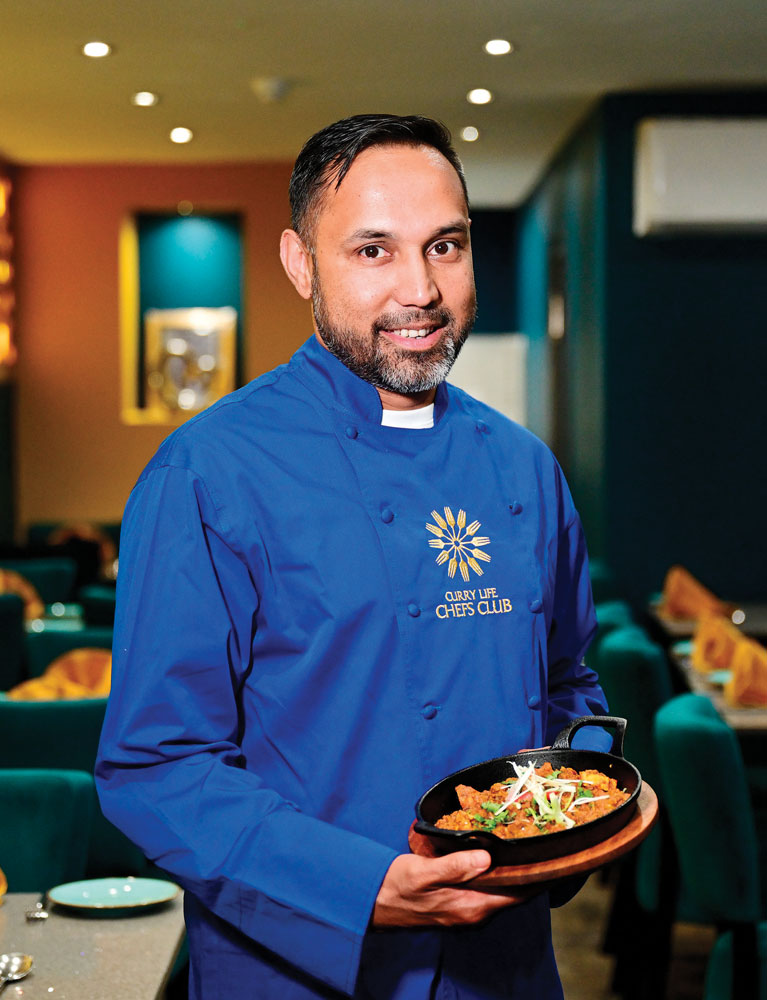
“I’m happy to have my place in Howden but I have been approached by others about going into business with them but I have declined,” he says. “I like where I am and continue to give one thousand percent, whereas it would be one hundred percent somewhere else,” he says.
Having started at an early age, Ash has had plenty of experience running all aspects of a restaurant, but his main focus is on the front of the house and ensuring that his many customers – both regulars and new ones are happy.
“We can seat around 65 diners and we like to focus on our customers – we have a lounge where they can have a drink first, so they can make an evening of it,” says Ash. “It’s important to think about the customers and to be able to see them – this is why we don’t offer a delivery service. People pick up takeaways directly so we ensure they get the meal in good time and we can do quality control.”
And Ash is always keen to learn on the job, particularly with his chef, looking at different cooking techniques and dishes. “I am always tweaking things and open to suggestions. It’s best for my business when I have a passion, which starts from when the customers arrive, to see what we can do with food, in terms of presentation and trying different spices, to their enjoyment of the dish,” he says. “Even in my spare time, I look at a lot of social media to discover what different chefs are cooking and creating.”
Changing times
Ash is not someone to rest on their laurels – he believes in moving with the times and recognises that customers do not always want ‘same old, same old.’
“It’s good to introduce change – not just with the curries but with the surroundings too – we have done refurbishments over the last few years and now have quite a contemporary look, it’s about bigger and better,” he says. “ We also apply the same methodology to our menu and change this when we can, and we also test different dishes with our customers. They always give us tips and advice that we can apply to our new menu. We have a fantastic chef who is also a business partner; chef Shelim Uddin looks after our kitchen team.
The presentation of dishes is all important too. Even with his near-15 years in business – and having started a long time before the likes of Instagram, X (formerly Twitter) and TikTok took off, Ash is keenly aware of the power of social media.
“Presentation is all-important – when people eat they want to take pictures for Instagram, so the way the food looks is a big factor,” he says. “Many restaurants need to work on this, some are still serving and presenting food in the same way as when they first opened. I am willing to try different things but I also think it is important to move with the times. There is no harm in doing something new and knowing that it either works or does not work.”
Curry closures
Ash is certainly keen on taking risks but also describes himself as an ‘over thinker’ – he likes to be 100% sure of something before he tries it. One thing he is no doubt about is the threat of closures hanging over the curry house industry, due to the difficulties in recruiting staff, the increasing cost of overheads such as electricity and the higher price of ingredients.
“I’ve looked at the number of places that have closed down and I know plenty of people in the industry who are thinking of selling up – the time and effort we put in is often now not enough,” he says. “However, I’ve been in this industry for nearly 15 years and I intend to stay at least another 15 years if not more.”
One of the areas crucial to Zolsha’s success is its menu – while the restaurant originally had a big menu, Ash said he soon realised it was better to narrow this down, focusing on making the best dishes even better – one he is especially proud of are those featuring king prawns.
“We serve really big king prawns – they are not the typical ones you might have in a curry,” he says. “We love to serve quality produce and show our diners that Indian cuisine can vary so much depending on different regions.”
Making a difference
Given his time again, what would Ash do differently with Zolsha? Thankfully, there isn’t a lot he would change but he would have been a bit more experimental with the menu.
“If I could go back five, six or seven years, I would have invited different chefs from other regions to come and cook at Zolsha – just for a couple of days,” he says. “When you see other chefs from different parts of the UK, you realise that everyone has an alternative way of doing things – it might not necessarily be a better way, but it gives you ideas. A new chef can give a lot of advice and a new perspective.”
In the current climate, Ash is focusing on making his business the best it can be, and making sure his passion continues for years to come.
Zolsha
4 Bridgegate
Howden
Goole DN14 7AB
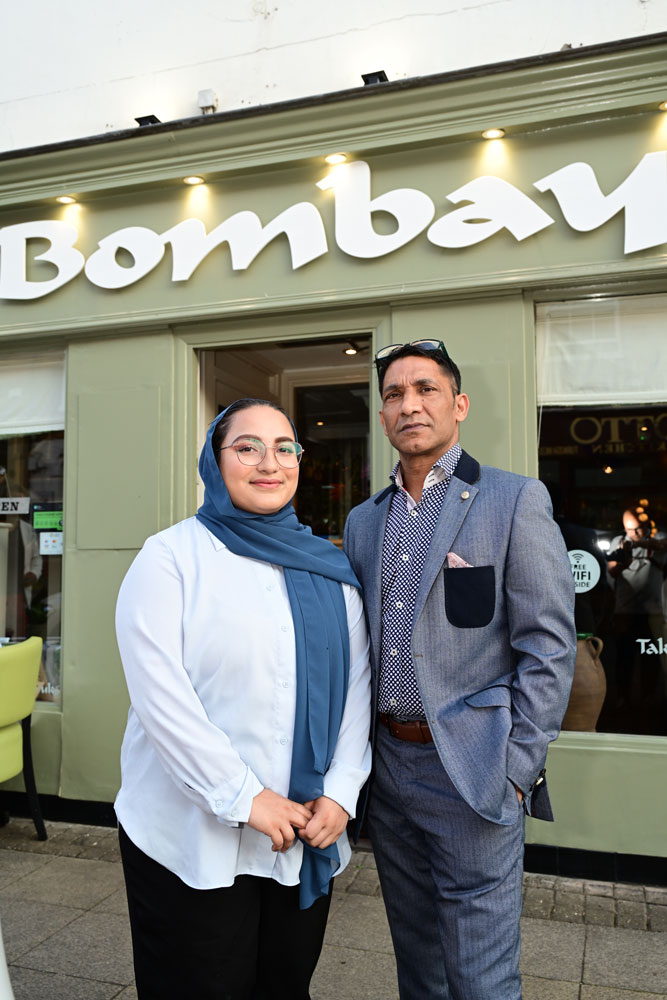
A MODERN FAMILY BUSINESS
Bombay restaurant is run by a father and daughter team and there are ambitious plans for the future
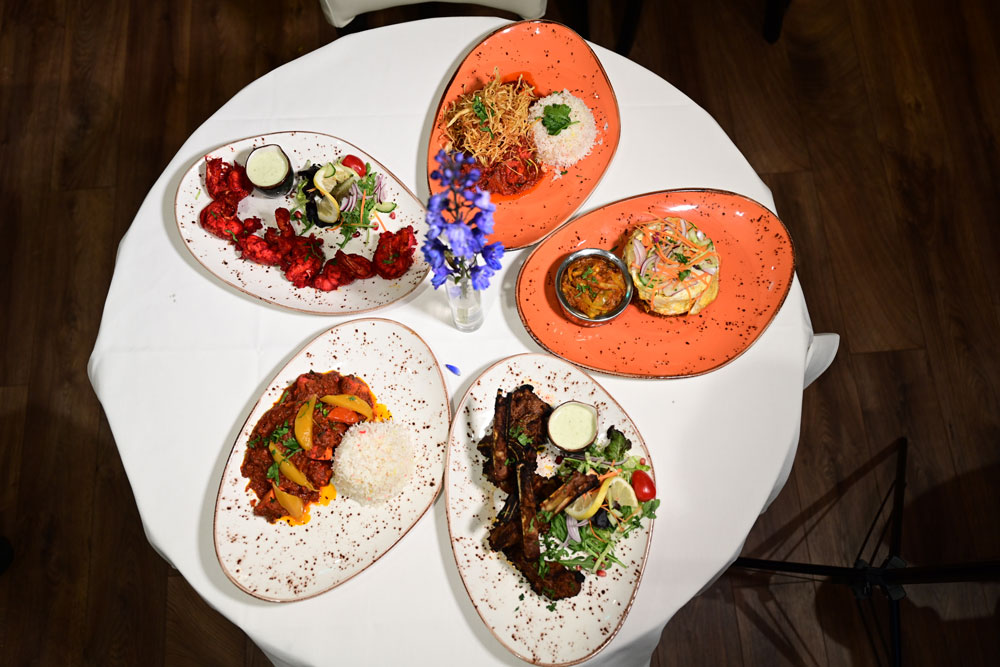
Bombay Tandoori Restaurant in Leamington Spa is one of the longest-serving Indian restaurants in the town, having first opened its doors back in 1980. Despite the number of years it has been in business, it’s not your typical, traditional curry house however, as it’s currently managed by a woman – Iftahara Nisa Ahmed.
Moreover, as Iftahara says, the fact that she wears a hijab and works in a restaurant that serves alcohol, makes a different situation even more unusual. She only joined the business just under six years ago (it was originally opened by her uncle and then run by other family members), and she now works alongside her father, who is the restaurant chef.
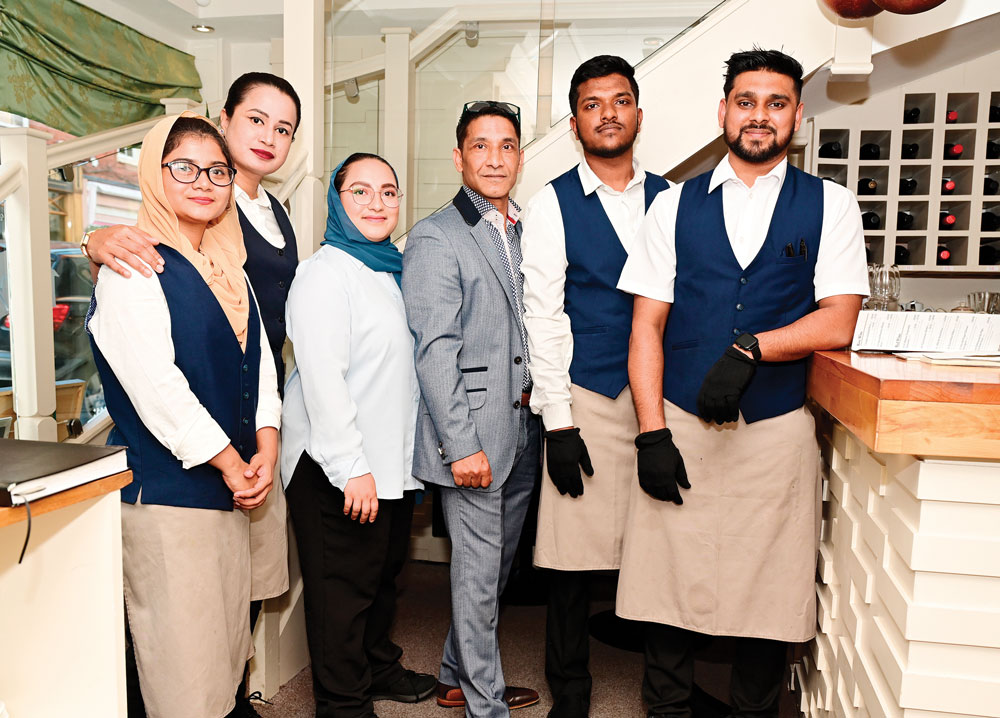
Girl power
“In the beginning, my dad was a bit hesitant, because I’m the first woman in my entire family from the fourth generation to ever work in a restaurant,” explains Iftahara. “My dad has quite a modern outlook though – he said I could try working there for two days a week and it will be fun, and I’m still here nearly six years later.”
Iftahara believes there should be more women working in the industry – Bombay employs three other women – one in the kitchen and two in front of house, and Iftahara says customers are often commenting on how it’s refreshing to see women working in an Indian restaurant.
“People like it – Indian restaurants [in the UK] have been around for so many years and you hardly see any women working in them,” says Iftahara. “We’ve got a traditional restaurant but it also has a progressive, modern outlook and we have quite a few family and friends with restaurants, and their daughters are working there too. I couldn’t actually imagine myself anywhere else – I’m very invested in the business. If you ask my colleagues, they’ll tell you how passionate I am about the restaurant.”
A warm welcome
This passion extends not just to the food, service and smooth running of the restaurant, but to each and every customer. Bombay wants diners to feel welcomed from the moment they walk into the restaurant, as if they are part of one big family.
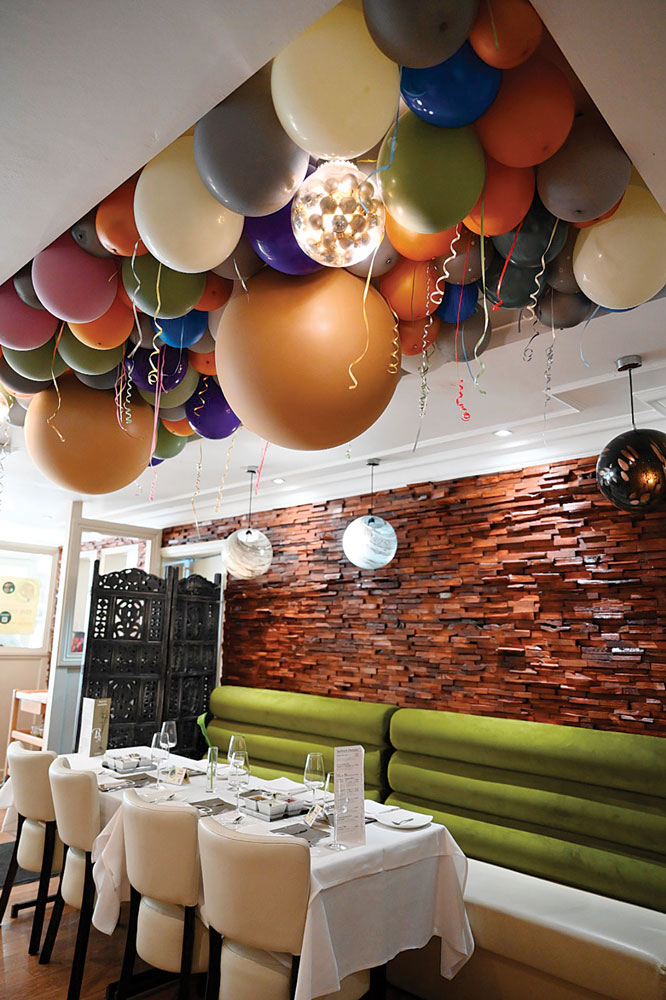
“We always want them to see a friendly face – our customers say it is like walking into someone’s home,” says Iftahara. “Even when we have new staff joining, we tell them to go and speak to the customers and be friendly. We have so many customers who have been coming in since the 1980s.”
Restaurant staff are very knowledgeable when it comes to the regulars’ food and drink orders, to the point that they enjoy a bit of conversation before serving customers’ favourite dishes.
“Knowing the customer’s drinks order or whether they want papadums – it’s a simple thing really but customers are really happy and receptive that we’ve remembered these details,” adds Iftahara. “Our client base is so loyal that they help to spread our name around and strengthen our reputation. We’ve had diners from Cambridge and Oxford who tell us the restaurant has been recommended to them.”
In an industry that is facing some of its toughest challenges yet, with increased costs having led to many closures in the curry house sector, it’s these customers who keep Iftahara motivated day in and day out.
“The loyal diners and the fact that we are busy on Fridays and Saturdays – this is when all the adrenaline kicks in – we’ve also got a great team,” she acknowledges. “Without our customers, we wouldn’t have the business we have today. It’s because of them that we are still here 45 years later.”
Family support
Much of Bombay’s success is also down to Iftahara’s father – the restaurant went through some tough times in 2016, when her father decided to take over the running of the business.
“Everyone is amazed at where he has taken the business in the last six years,” says Iftahara. “Before 2016, Bombay had reached a low point, it was starting to lose business. There is around a 10-year age gap between my uncle and my father and he came to the restaurant with an open mind and fresh ideas.”
As an added bonus, Iftahara’s father is also a decorator and painter, which enabled him to give the restaurant a much-needed makeover. In fact, he still does a refresh every few months, keenly aware of the benefits to the business. Both father and daughter have also made quite a few changes since joining, not all of which have been easy decisions to make.
They tackled the menu – not straight away however, but gradually, reducing the number of dishes, refining existing ones and adding new ones. They continue to revise the menu on a regular basis while retaining the classic dishes that customers love, as Iftahara says, ‘diners will get bored otherwise’.
“Over the last six years, we’ve dealt with a number of issues, such as price increases – when I first started, the menu was quite cheap, now it is more reasonably-priced, but we did lose some customers,” she says. “And there will always be others who still see the prices as expensive, particularly post-Covid and with the continued cost of living crisis.”
While Iftahara does enjoy cooking, she leaves this part of the business to her father, who has been a skilled chef for more than two decades. He actually learnt the trade at Bombay in the 1990s, before moving on to another Indian restaurant, and then returning to Bombay. The restaurant’s signature dishes include Chicken Tikka Akbari, featuring diced chicken tikka with mince meat in a hot scotch bonnet sauce, and Pasmishali Naga Special, chicken tikka prepared in a hot Naga sauce and garnished with potato straws and coriander. Iftahara does take a great interest in how the food tastes and looks, believing that food presentation and flavours are just as important as the cooking side.
Ongoing challenges
“Many of the staff at Indian restaurants are from the same family, and it’s a lot harder to recruit staff now than before,” says Iftahara. “Family members are choosing to go into different sectors, they’re doing graduate jobs – anything but working in a restaurant and attracting them is one of the biggest hurdles we face. My dad has plenty of friends involved in restaurants and they all agree on this – most people seem to want to work from home or have a 9-5 job.”
Many of Bombay’s staff members are relatively new, having been there for between six months to a year, and retaining them is another challenge – Iftahara is all too aware that young people are keen to move onto new things on a regular basis.
For the present time, however, Iftahara has no plans to move on – in fact she is keen to take over the running of the business from her father and expand, with ambitions to open new branches of Bombay in the not too distant future.
Bombay Restaurant
38-40 Regent Street
Leamington Spa
CV32 5EG
www.bombayleamington.co.uk
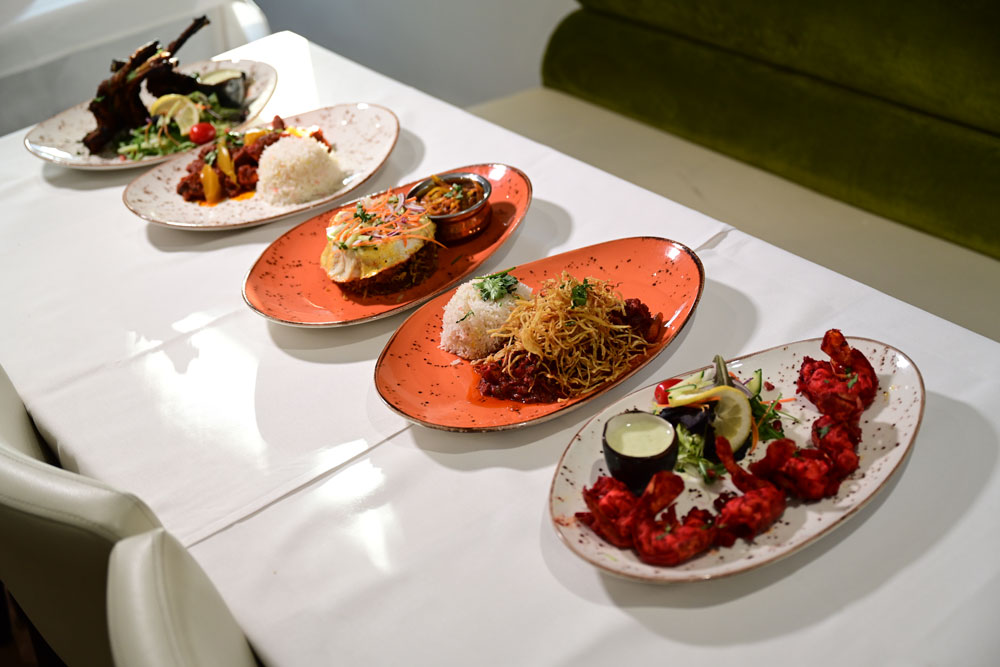

END OF BRITISH CURRY AWARDS
The British Curry Awards, which have been running for 18 years, will no longer take place, with the Awards rebranded to a new platform called the British Curry Guide.
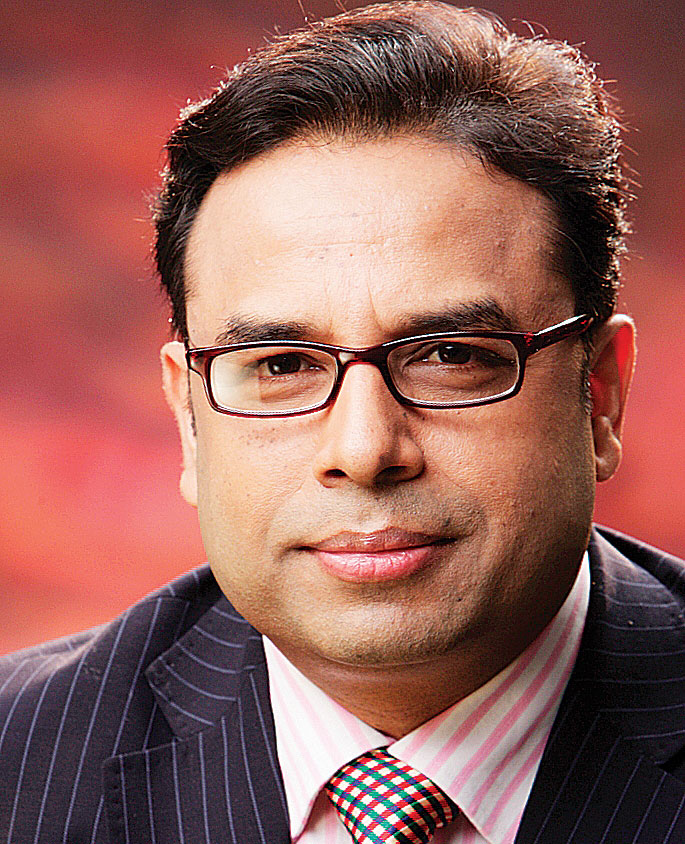
The decision to end the Awards scheme follows the passing of its founder, Enam Ali MBE, who died in July last year. The British Curry Guide aims to build on the legacy of the Awards, and says it will take a fresh approach to showcasing the best of British Indian cuisine.
A note on the British Curry Guide website said: “We are thrilled to continue the legacy of the British Curry Awards by creating a new chapter from our renowned brand. Our vision is to become the go-to resource for the nation’s diners, providing them with a comprehensive guide that goes beyond awards to offer a thoughtfully produced showcase to help curate a better dining experience, expert recommendations, and insightful content that celebrates the richness and diversity of this beloved cuisine.
“As we bid farewell to the British Curry Awards, we embark on an exciting new chapter with The British Curry Guide. We invite you to join us on this remarkable journey, as we continue to celebrate the passion, creativity, and culinary mastery of British Indian cuisine. Together, let us explore the flavours, traditions, and stories that make this cuisine a true reflection of our cultural heritage and gastronomic delight.”
The British Curry Guide will be ‘the definitive list of the most exceptional curry restaurants in Britain. Its website said: “It is a comprehensive resource that encompasses the rich tapestry of the UK curry industry, providing invaluable guidance, expert recommendations, and a platform for curry enthusiasts to explore, appreciate, and engage with the world of curry.”
The Guide will feature the views of ‘dining inspectors’, comprised of industry professionals with decades of experience, who will follow a meticulous thoughtfully created framework when evaluating the quality of an establishment nominated to enter the guide’.
The British Curry Awards was established by Ali in 2005. The last edition and event took place in November last year.
Read more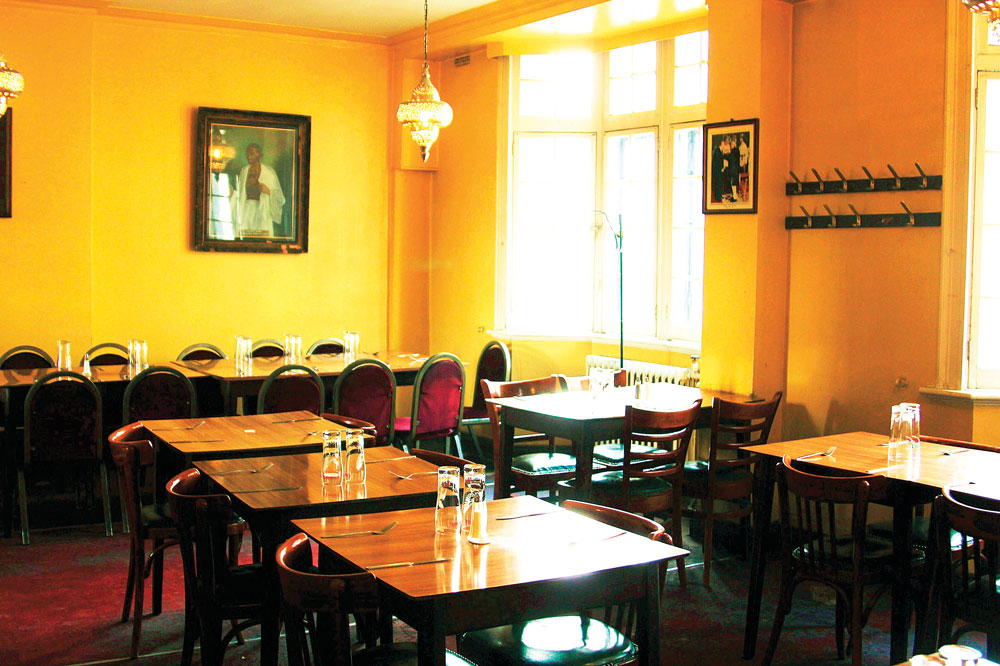
Iconic India Club to close
Rita Payne

Tributes and laments have been pouring in from the UK and abroad following confirmation that a much-loved Indian restaurant and hotel in central London is to close. The India Club has fended off previous attempts to shut it down to make way for a glossy new development. The battle has now been lost and many of its loyal supporters are devastated.
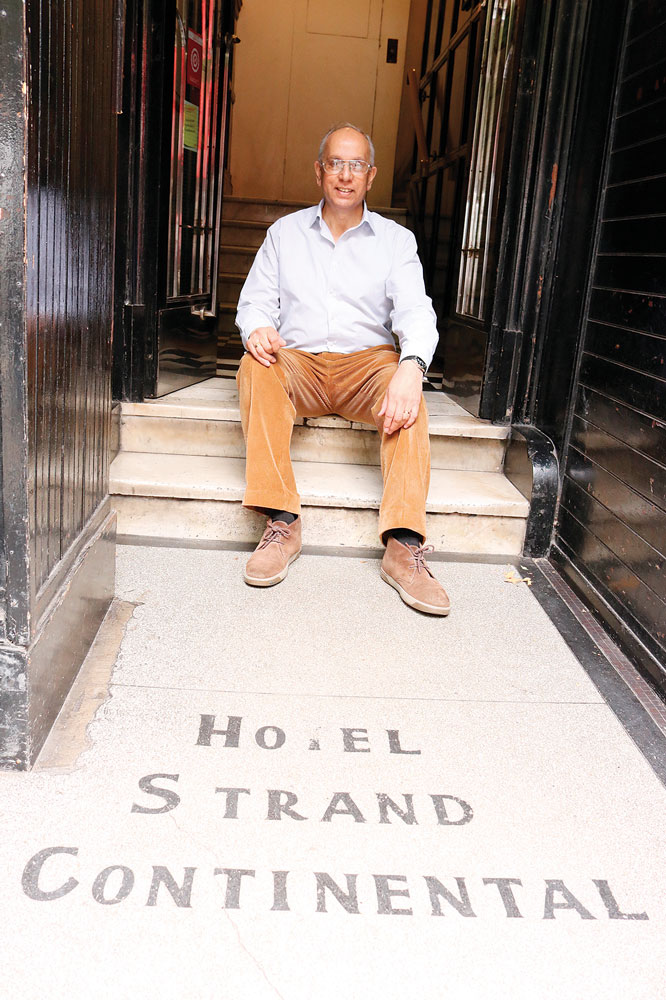
Ever since the news broke of the Club’s closure after 70 years there have been daily queues outside with two-hour waits for a table. People are clearly anxious to eat in the restaurant before a beloved part of London’s heritage disappears.
India Club is on the first floor of the Hotel Strand Continental. It is a modest building and easy to miss with only a small sign outside. One enters through a door up a winding staircase to a bar on the first floor and restaurant on the second with meeting rooms and a handful of bedrooms.
Founded in 1951 on The Strand, the India Club was regarded by many Indians residing in the UK as a ‘home away from home’ It was a popular meeting place for leading writers, intellectuals and politicians associated with India’s independence. It is of historical significance for both India and the UK, having been set up by Krishna Menon, India’s first High Commissioner to the UK with Lady Mountbatten and Prime Minister Jawaharlal Nehru as founding members. They would meet beneath the stained glass windows of the art-deco style bar to discuss their plans for India’s future. Their photos still adorn the walls of the restaurant, bar and meeting rooms. Other well known regulars included the Labour politician Michael Foot, and artist M F Husain who are no longer around to bemoan the closure of their favoured eating place. Renowned figures who are reputed to have dined there over the years include Dadabhai Naoroji, the first British Indian MP, and philosopher Bertrand Russell.
The British-Indian politician and businessman, Lord Karan Bilimoria, said: “I helped to save it 6 years ago and fought very hard, however now the landlords have finally got their way. I used to go to it as boy with my father 50 years ago when he was posted in the UK. as a Colonel! Very sad to see a historic institution close. It is one of the first restaurants I sold Cobra Beer to and a loyal customer for nearly 1/3rd of a century!”
Congress MP Shashi Tharoor, too, expressed his sorrow at the closure of this iconic eatery. In a heartfelt post on X (formerly Twitter) Tharoor wrote, “As the son of one of its founders, I lament the passing of an institution that served so many Indians (and not only Indians) for nearly three-quarters of a century. For many students, journalists and travellers, it was a home away from home, offering simple and good quality Indian food at affordable prices as well as a convivial atmosphere to meet and maintain friendships.”
He also shared two images along with the post adding, “As the picture shows, I was there this summer with my sister (we are standing in front of photos of my father attending club events in the early 1950s) and am sad to realise that that was my last visit, since I will not be returning to London this year. Om Shanti!”
Since the Club is located opposite Bush House which served as the headquarters of the BBC World Service for seventy years, it was a regular haunt for journalists like me who worked there.
Ruth Hogarth, a former Bush House colleague, recalls: “During my 20 years at Bush House, across the road from the India Club, I was a regular visitor along with many World Service colleagues. I particularly loved the dosas in the unpretentious restaurant on the second floor, snatched during a break in a long night shift. Later, when I worked for King’s College London on the Strand campus,the beautiful first floor bar was our go-to place for cocktails to celebrate special occasions.”
Another BBC journalist, Mike Jervis, says: “Climbing the stairs to the India Club was like entering a different old-style world. The calm atmosphere and no frills traditional food provided a welcome dinner break from the pressures of the newsroom. But there were also other diversions like attending the launch of books by former colleagues.”
It is difficult to explain the appeal of an establishment which made little attempt to change with the times. When regular diners visited they knew exactly what was on the menu, simple South Indian fare: poppadoms served with coconut salsa and lime pickle, samosas, an assortment of bhajis, creamy chickpeas, tender lamb bhuna, butter chicken, paneer with finely chopped spinach and a choice of parathas and other breads. Prices are modest, you leave feeling full without hurting your wallet compared to newer and trendier Indian restaurants with eye-watering charges. The Marker family have been running the India Club since rescuing it from near-ruin some twenty years ago. They are proud of sticking to their roots and refusing to be intimidated by trendier restaurants sprouting around them. They were committed to preserving its authenticity and this clearly struck a chord with its customers. Sadly, they have finally been forced to succumb to the power and influence of big developers who value profit more than history, culture and tradition. With the demise of the treasured India Club a crucial part of the joint heritage of the UK and India will be lost for ever.
Read more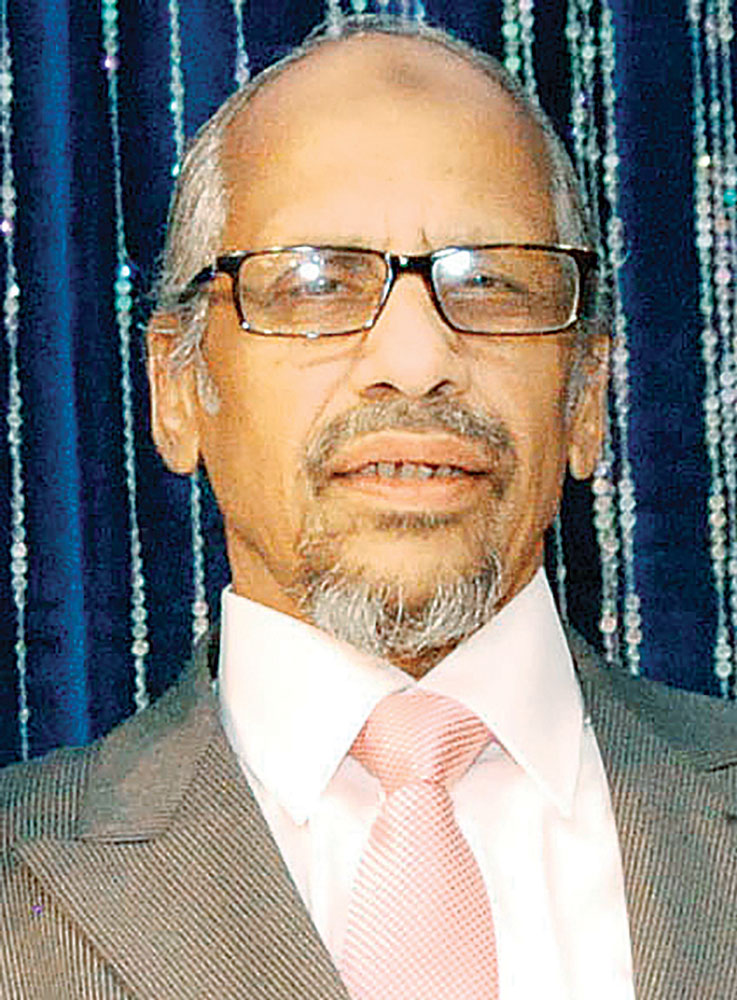
Tribute to former BCA president Meah Monirul Alam

Meah Monirul Alam
Meah Monirul Alam, one of the UK’s longest-serving and most successful Bangladeshi restaurateurs, and former president of the Bangladesh Caterers Association (BCA) passed away on 23 July at the age of 82.
The prominent businessman and community leader, who championed the curry industry for more than five decades, first arrived in London in 1960 as a student aged 22. He worked part-time in his uncle’s restaurant before opening his first business three years later.
He had interests in 25 restaurants across Kent and London during the 1970s, and his sons still run the Kashmir restaurant in his home town of Canterbury.
Meah quickly recognised that the public appetite for curry was greater outside the capital, seizing the opportunity to relocate to the south coast. His first restaurant, Calcutta, was the only Indian restaurant within a 60-miles radius and also housed a nightclub for diners who hadn’t worked up enough of a sweat with their curry.
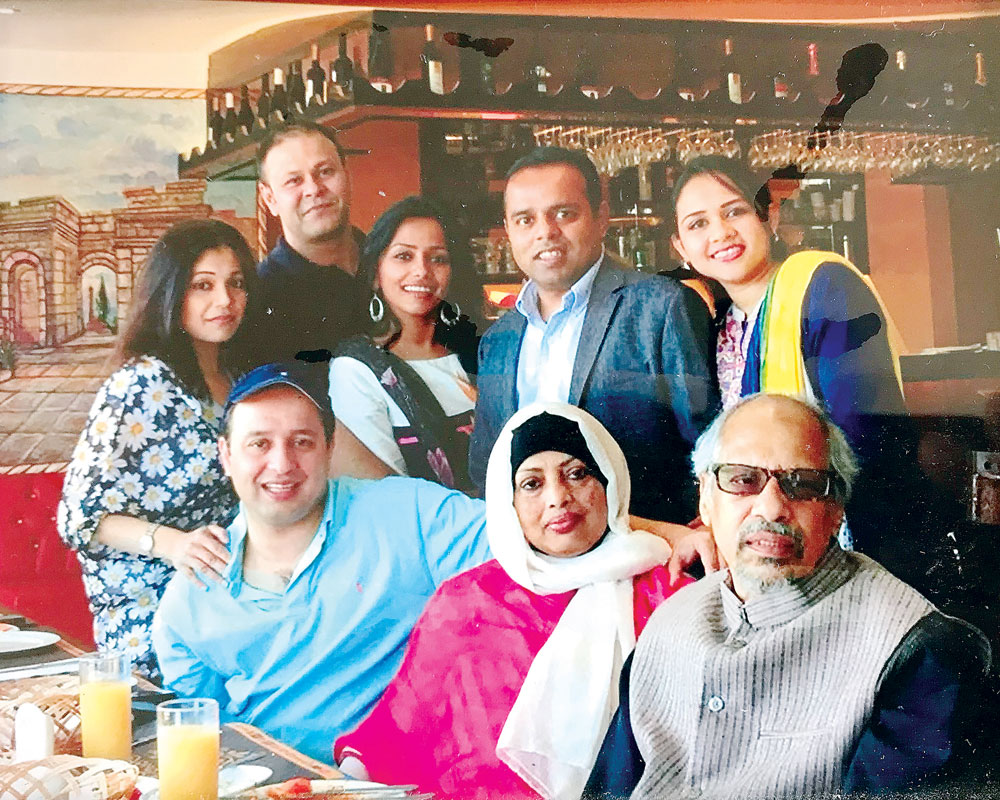
The father of four actively encouraged other Bangladeshis to set up restaurants in Kent and offered loans to help them get started. His interest in raising the profile of Bangladeshi restaurateurs and championing the fact that it was predominantly Bengalis, not Indians, who were spearheading the industry led him to become president of the Bangladeshi Caterers Association in the 1990s.
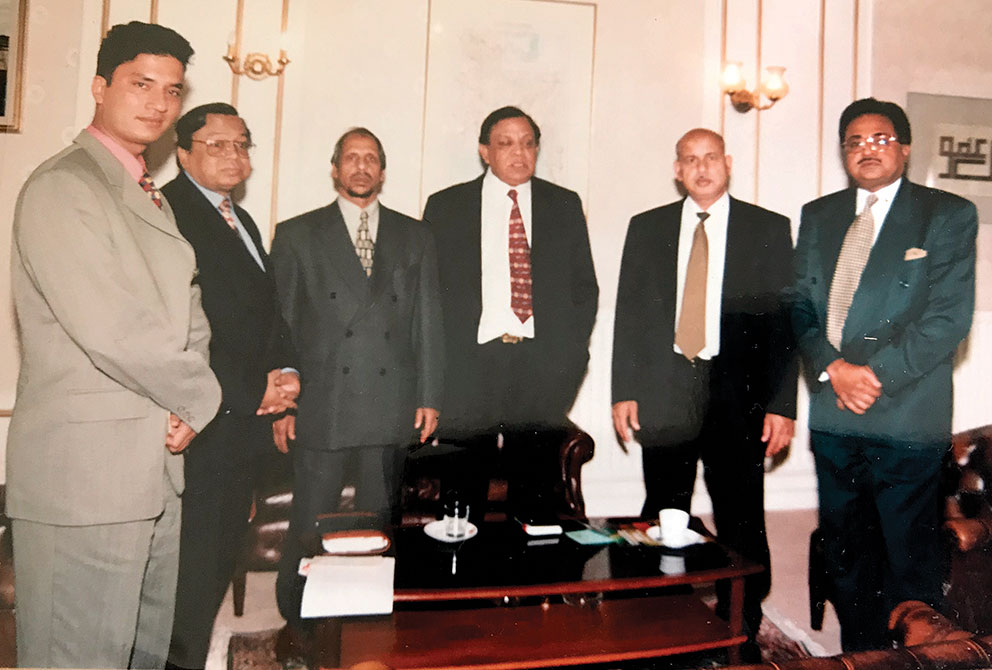
He successfully raised the organisation’s membership as he did in another high-profile role, as the leader of the UK branch of the Bangladeshi Nationalist Party. His community activities included setting up an Islamic cultural centre and mosque in his adopted home and acting as an advisor and confidante to the local community.
They say behind every great man is a woman, and his wife, Raushon Ara, says one of her greatest battles was getting her husband to retire from an industry he helped shape for nearly 55 years. Speaking to Curry Life magazine in 2017, Meah said he had no regrets.
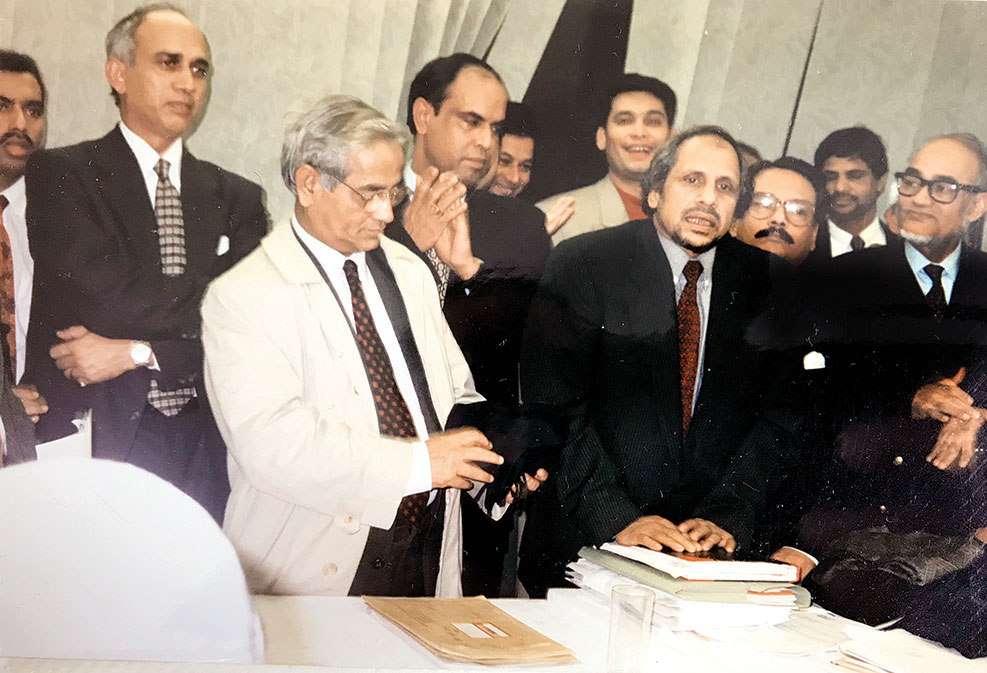
“It was hard work, but I always remained interested and passionate about my work,” he said. “It’s been a pleasure helping my fellow countrymen get started in the business, flying the flag for Bangladeshi caterers and serving the public. My advice to anyone starting in this industry is to work hard and be nice to people. Success will come.”
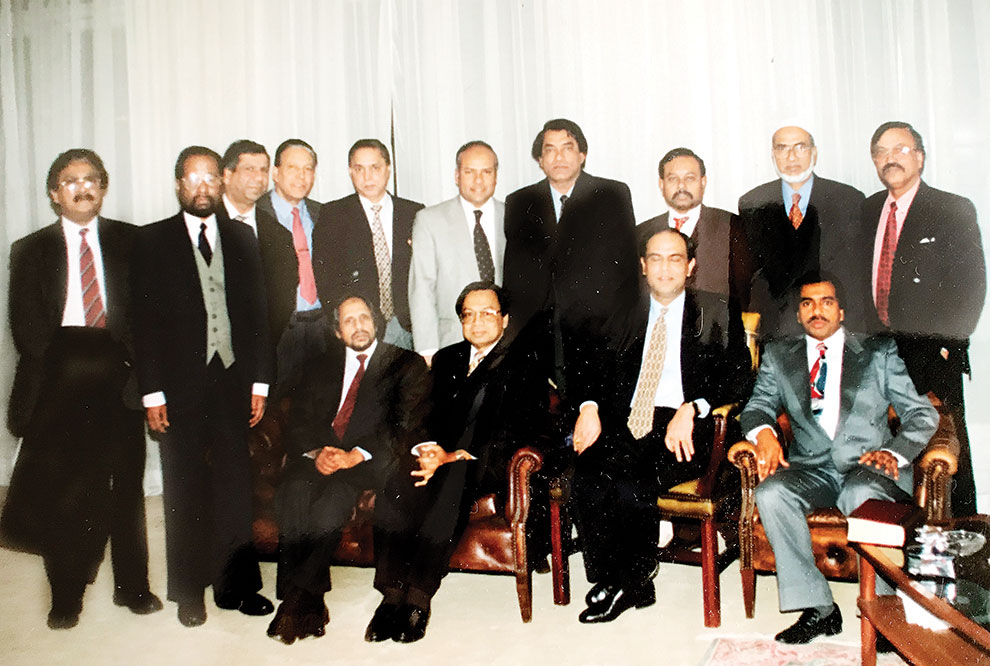
Meah Monirul Alam was awarded a Lifetime Achievement Award at the Curry Life Awards in 2017 for his contributions and services to the British curry industry, with the awards hosted by journalist and broadcaster Michael Buerk.
At the time, he was not well enough to attend the ceremony, with his son Ruhul Alam receiving the award on his behalf. Kashmir restaurant customers left many tributes to MeahMonirulAlam, saying: “He was a wonderful man,” and “What a legacy your father has left to his family and all of Canterbury.”
Read more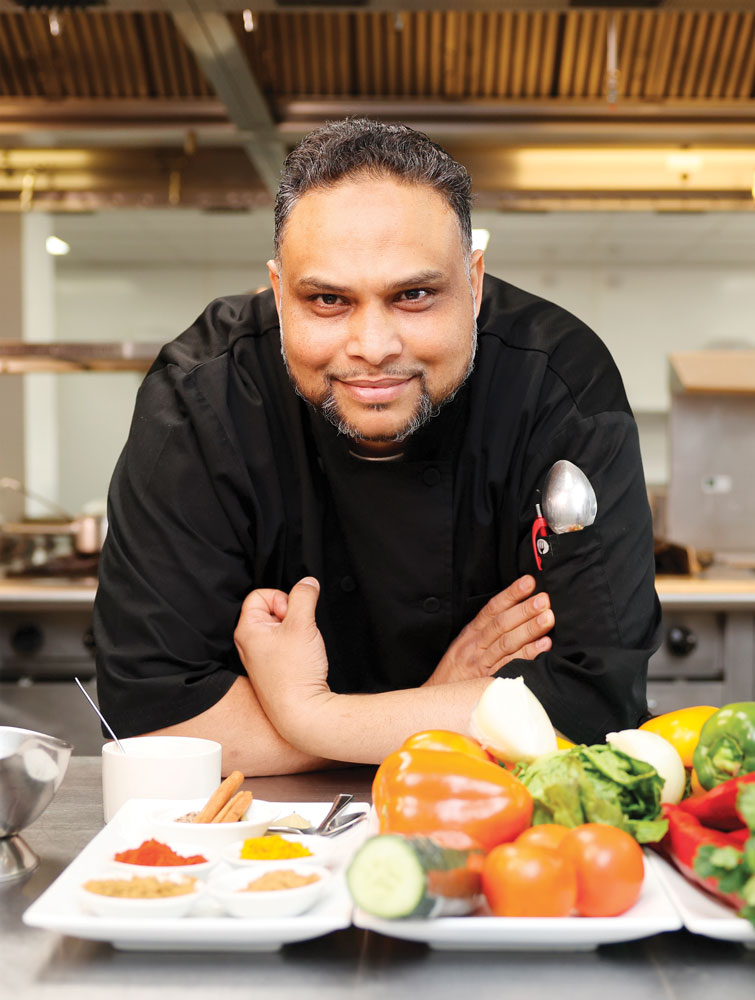
Pursue Your Passion
Atikur Rahman is making an impassioned plea for more training for the curry house sector
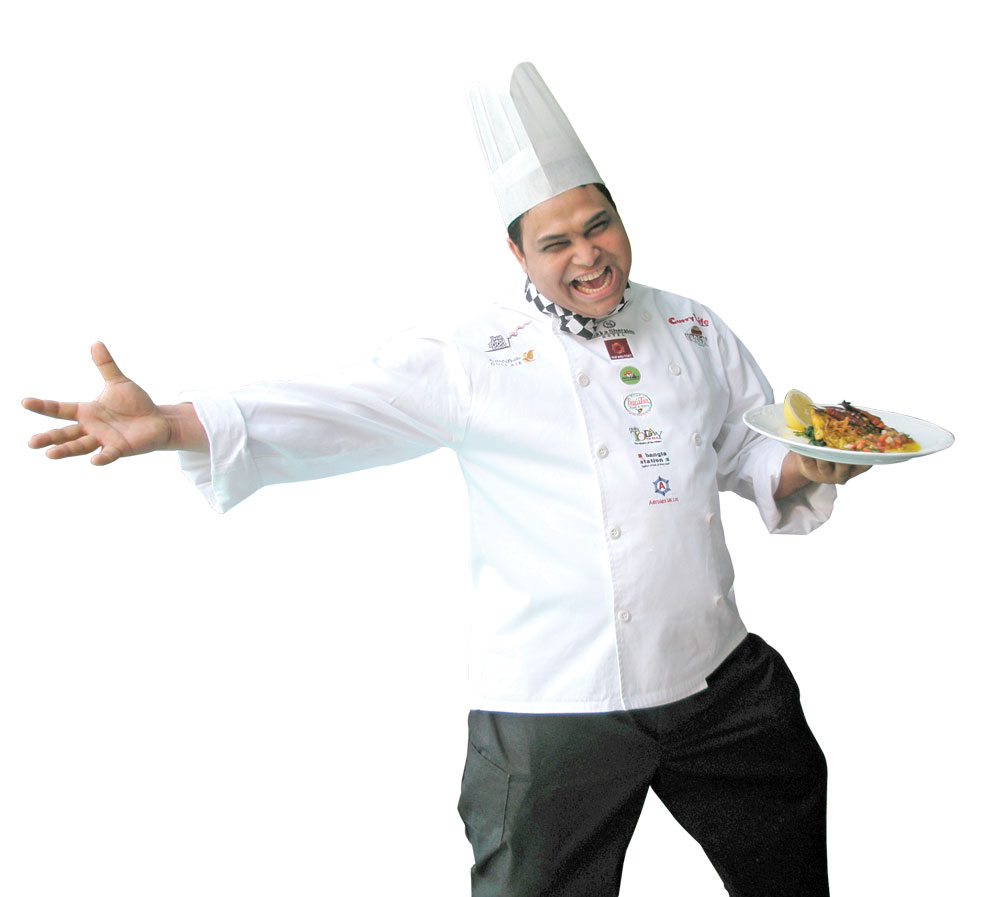
As chef at Brick Lane’s Graam Bangla restaurant, with many years of experience working as a consultant to curry houses and having been involved with the Bangladesh Caterers Association (BCA), Atikur Rahman is undoubtedly in an excellent position to comment on the state of the curry house sector.
“One of the biggest issues for curry houses is a lack of trained chefs,” he says. “I need to organise training for chefs – if we want to save the curry industry, we must act right now. Every day, curry houses are closing. We might bring chefs from abroad, but we still have to train them as they need to learn different cooking methods. Healthy dishes and organic food with all the flavour are the new trends – you need to know the calories and ingredients you are using.”
Rahman came to the UK in 1999, when he was around 19 years old. He studied catering by working in a number of hotels, before moving to the Indian Nawab restaurant in Earls Court, where he says it was sometimes challenging to learn on the job.
“I used to work in the kitchen, and when the chef added spices, he would never show me,” he says. “I found it quite upsetting but
it made me determined to be a chef, so I started to train professionally.”
To complement his training, Rahman worked at another restaurant in Fulham Road, and this time he picked up many tips and techniques from the chef, all of which sparked his passion for cooking.
“I first learnt to cook from my mother when I was 17, and this chef showed me all the basics and more,” says Rahman. “I learnt so many things from him, to the point that I was able to open a restaurant.”
He started Exotic East in Southall with a Punjabi partner. While the other restaurants specialised in meat dishes, Exotic East became a great favourite with its vegetable dishes particularly Vegetable Haven Pumpkin, oven-baked pumpkins and other unusual dishes. He then moved to Wales, to the Tamarind in Cwmbran and then to a restaurant in Abergavenny also called Exotic East.
Festival fever
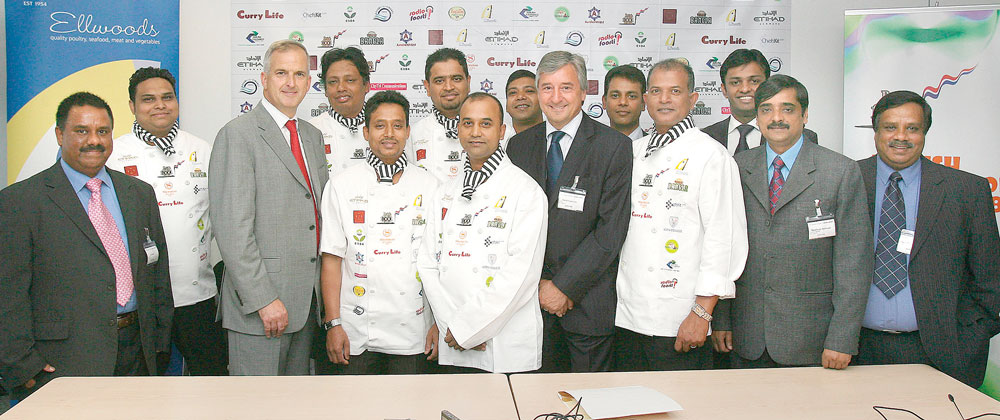
London press launch of the British Fusion Food Festival Dhaka at Canary Wharf in 2007
At this point, Rahman became involved with the British Curry Festival (which at the time was known as the British Fusion Food Festival). He took part in the event when it was hosted in Dhaka in Bangladesh in 2006, enabling him to showcase his fusion cooking style, with European dishes given an Asian twist.
“My experience in Dhaka changed my life – it was the first time I had received any exposure, and when I came back to the restaurant, we saw business almost doubling,” he said.”My confidence grew too – I was confident as a chef before, but on my return from the festival, I felt I could do much more, having met so many different chefs there, so it was an easy decision to attend the event the following year.”
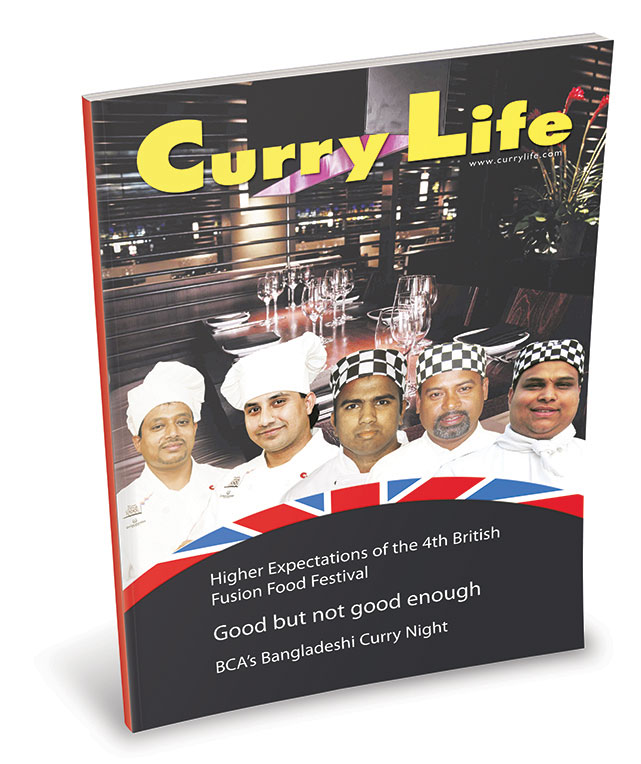
At the time, in a previous interview for Curry Life, Rahman said: “ For me it is a learning experience because I will be meeting some of the top chefs of the curry world in Dhaka. I go in a spirit of humility and hope when I return to be able to produce some famous traditional dishes.”
Rahman believes the concept of the Festival – founded in 2002 to promote British curry as a brand, showcases the best of British cuisine alongside popular curry house dishes.
“Bangladeshi chefs are great cooks, particularly when it comes to preparation and processes,” he says. “They can prepare many dishes in a short time frame, under pressure, and serve 200 people for example. That’s the expertise that curry house chefs have.”
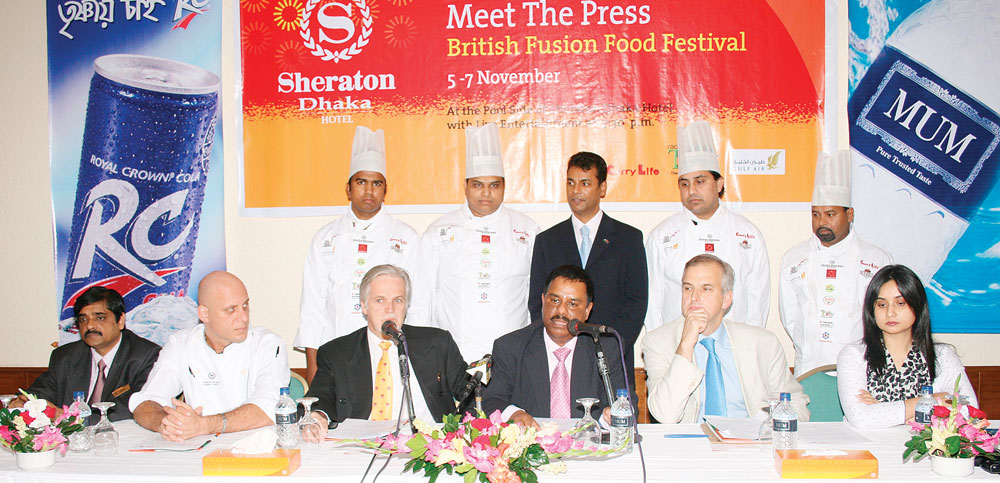
Chef Atik with other chefs at a press conference with British Fusion Food Festival organiser in Dhaka Sheraton in 2006.
Lessons learnt
Perhaps not unsurprisingly, following his success in Dhaka, Rahman set his sights on learning as much as possible. He left Exotic East for a job in London in 2009, working at Sir Terence Conran’s iconic restaurant Bluebird in the heart of Chelsea and also had stints as a personal chef. He also became involved with the Bangladesh Caterers Association, as a judge for their chef awards.
Over the years, Rahman has also built up an impressive repertoire of hundreds of recipes and Graam Bangla also served King Charles some dishes, including Hilsa fish when he visited the area in February. Having built up considerable experience with his work across many restaurants, at Curry Life events, and at the BCA, Rahman is currently involved in training chefs in Hammersmith, West London, focusing on food management.
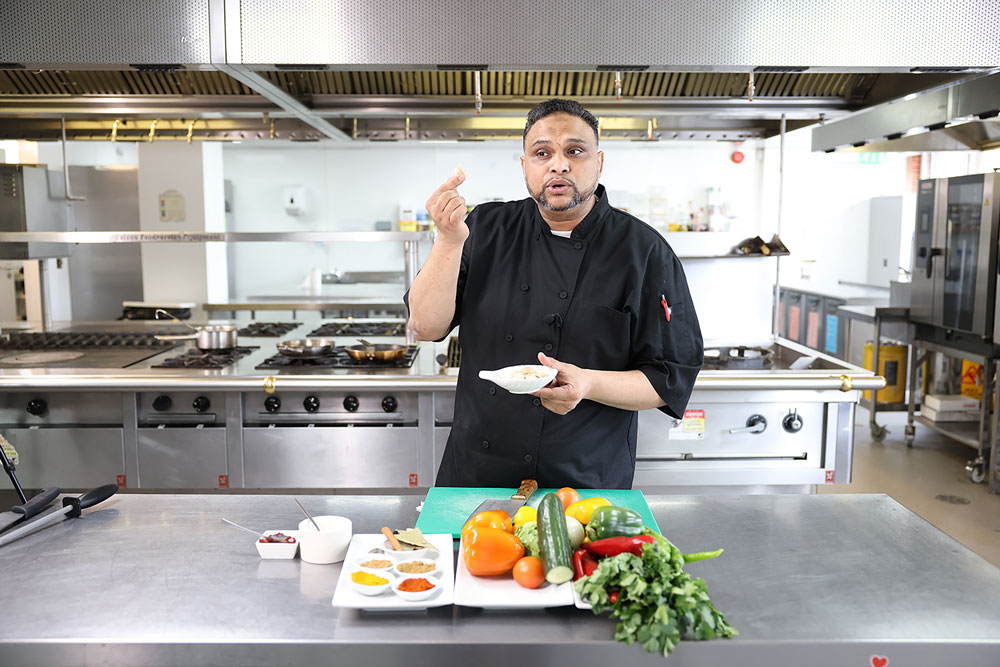
“If you are a really good curry chef, you still need someone behind you to help push you and keep you motivated,” he says. “If I hadn’t had the opportunity to meet Curry Life for example and take part in its festival, I probably would not have left Abergavenny. You need to learn about different chefs, cuisines and skills.”
Rahman has also taken part in cookery programmes on Bangladeshi TV channels in the UK, and he’ s not just focused on curry dishes but on modern European cuisine too.
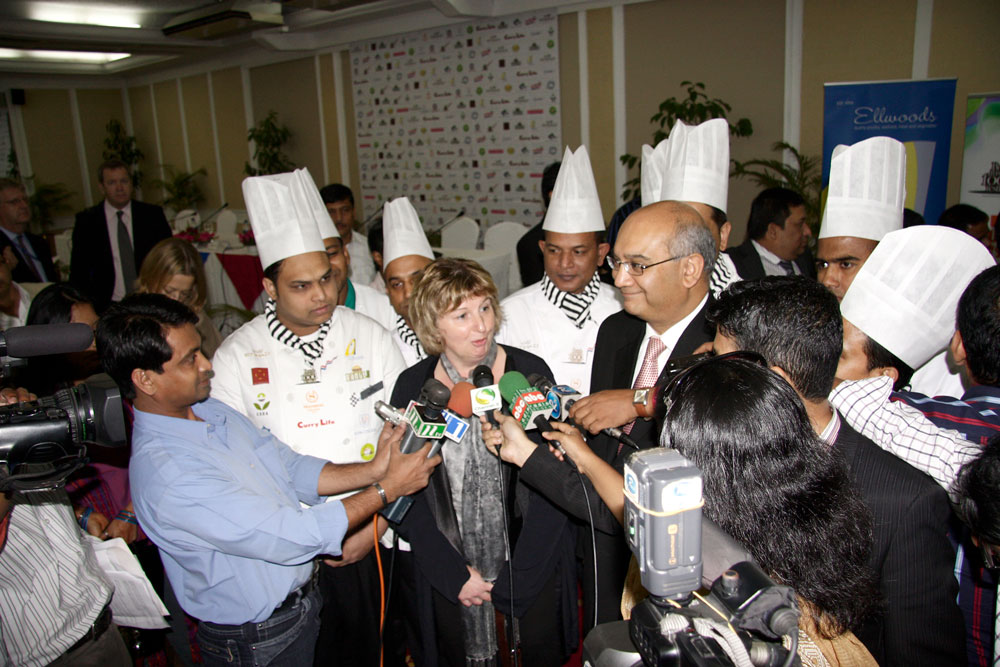
“We need to teach curry houses that it’s all about the presentation, which very often can be poor,” says Rahman. “ It’s not about how they cook or the chef but the way the food looks.”
Having been seriously ill during the pandemic, Rahman says his perspective has changed, prompting him to want to continue working to help others.

To this end, he is also heavily involved in charity work, including one organisation supporting orphaned children in Bangladesh, and another where he cooks a number of dishes free of charge, which the charity can then sell to raise funds. Cooking remains very much his passion – even when he was in the hospital, he says he spent most of the time thinking of recipes – after all, as Rahman puts it, ‘everyone loves curry.’
Read more
BCA elections up in the air amid membership disputes


Ballot box vector icon
The election of the executive committee of the Bangladesh Caterers Association (BCA), the oldest organisation of Bangladeshi restaurateurs in the UK, hangs in the balance.
Elections were due to be held on March 5th, but the polls have yet to be held following a dispute over the eligibility of new membership. There is frustration among ordinary members as the organisation has not seen a democratically-elected committee in the last twenty years.
The BCA elections have now been thrown into uncertainty after a recent meeting of the National Executive Council (NEC) to fix an election date; approval of the membership ended without any decision due to heated arguments between the members of the two groups. According to a source present at the meeting, President M A Munim OBE expressed his displeasure and adjourned the meeting when members argued over two possible election dates, 3rd and 10th September.
No date set
Voicing their anger at this situation, many NEC members left the meeting. Curry Life tried contacting President M A Munim, but he was unavailable for comment at the time of writing. However, BCA Secretary General Mitu Chowdhury confirmed that the meeting had to end abruptly due to members’ arguments over election dates. Mitu Chowdhury told Curry Life that the NEC meeting would have to address these issues again, but he could not confirm a date by which it would be done.
Late last year, BCA members began preparations for a new election, with BCA leaders now elected directly by its members. Consequently, there was a lot of interest among the stakeholders. The election announcement created much excitement among BCA members and leaders. Two panels, Saffron and Vision, announced their candidates. All were engaged in recruiting new members, with the election date announced as March 5th and the last date for membership application set for January 24th. At that time, the membership of the BCA was only five hundred.
An Election Commission consisting of three members was also constituted to conduct the elections, with current President MA Munim expressing hope for a fair election.
Image crisis
A BCA committee was previously formed on September 7th 2003, by the direct vote of 121 members through previous elections, with Mahmadur Rashid elected as President and Ashraf Uddin elected as Secretary General. Problems with membership during elections within the Bangladesh Caterers Association have become the norm – in 2003, this prompted the organisation’s activities to be completely revamped. The BCA started anew with only 121 members. Later in 2012, again before the BCA elections, a panel boycotted the elections when allegations and counter-complaints emerged regarding membership applications. The organisation suffered a massive image crisis at that time.
Membership woes
Membership-related problems have remained. Elections were scheduled to be held on March 5th, 2023, but the membership could not be finalised due to repeated complaints by the leaders of the two panels. All applications are subject to scrutiny, and membership is still being determined. Six months after announcing the election programme, members are still unaware when elections will be held.
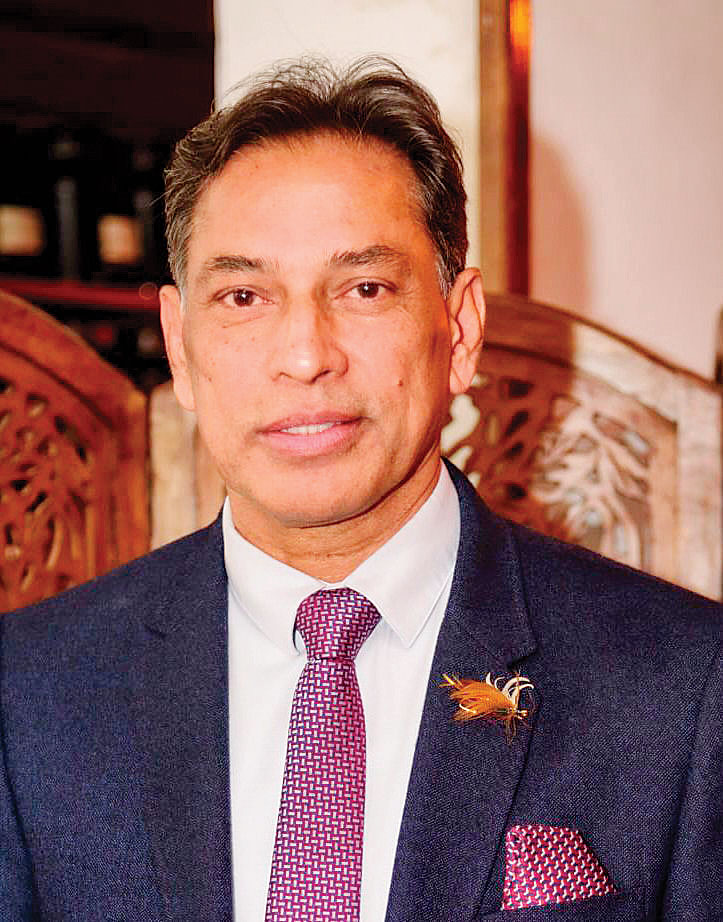
The current secretary general of the organisation, Mitu Chowdhury, said that two panels and two groups are participating in the BCA elections. New membership applications have been under scrutiny for the past few months, delaying the election. Chowdhury said that the NEC meeting on June 19th aimed to finalise the election date and final membership numbers, with possible dates being September 3rd or September 10th. This led to a disagreement between the leaders of the two groups, which turned into a verbal altercation. A few members walked out, and the meeting ended without any decision.
Mitu Chowdhury said membership approvals are almost over, and only a small number of applications have yet to be decided, which he believes will be done soon. He estimates the final members will number around 1700. Mitu Chowdhury is again contesting for the post of Secretary General in election.
Read more


